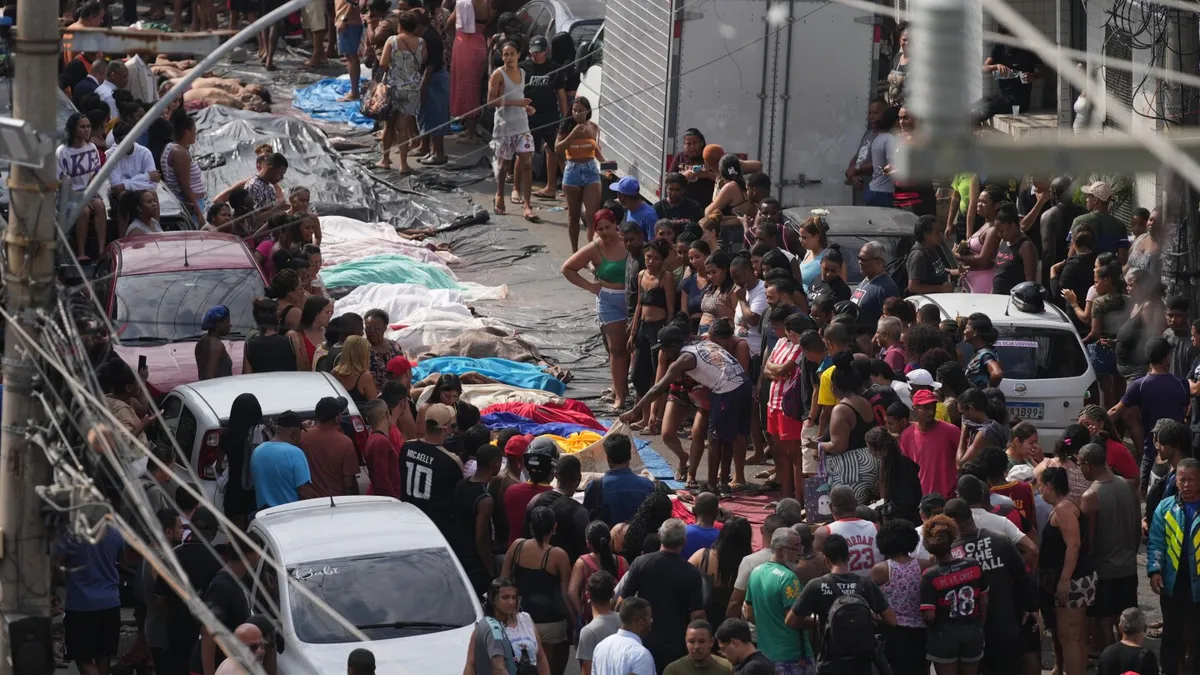
A recent police operation targeting a notorious drug gang in the low-income neighborhoods of Rio de Janeiro resulted in at least 119 fatalities, igniting widespread protests and calls for the resignation of the state's governor, Claudio Castro. Residents of various favelas gathered outside the government headquarters, chanting “assassins!” and waving Brazilian flags stained with red paint. This mobilization occurred just a day after what has been described as Rio’s deadliest police raid, wherein families laid dozens of bodies on the streets to illustrate the scale of the tragic event.
Questions surrounding the death toll and the condition of the deceased rapidly emerged. Reports indicated that many bodies exhibited signs of disfigurement and knife wounds. In light of these concerns, Brazil’s Supreme Court, along with various prosecutors and lawmakers, have demanded detailed information regarding the police operation from Governor Castro. Barbara Barbosa, a domestic worker from the Penha complex of favelas, characterized the event as a “massacre,” lamenting the loss of her son in a previous police operation. Activist Rute Sales, aged 56, echoed the sentiments of many, stating, “Do we have a death sentence? Stop killing us.”
The official toll reported by authorities indicated that 115 alleged suspects and four police officers were killed, a significant increase from the initial reports of 60 suspects. Felipe Curi, the Rio state police secretary, revealed that additional bodies were found in a wooded area where suspects allegedly wore camouflage while engaging with law enforcement. He noted that local residents had removed clothing and equipment from the bodies, which is now under investigation for potential evidence tampering.
On the same day, residents in Penha surrounded many of the deceased, which were transported in trucks and displayed in a main square, shouting “massacre” and “justice” before forensic teams arrived. Resident Elisangela Silva Santos, 50, expressed her outrage, stating, “They can take them to jail, why kill them like this? Lots of them were alive and calling for help. Yes, they’re traffickers, but they’re human.” The number of suspects arrested during the raid rose to 113, up from a previous count of 81, with authorities claiming to have seized around 90 rifles and over a ton of drugs.
The police operation unfolded with a heavy presence of helicopters, armored vehicles, and foot patrols targeting the Red Command gang. During the operation, gang members retaliated, leading to chaotic scenes across the city. Schools in the affected areas were forced to close, a local university canceled classes, and roads were obstructed with buses used as makeshift barriers. Many businesses remained shuttered the following morning, as local activist Raull Santiago reported that his team had discovered about 15 bodies before dawn.
Santiago described the brutality of the situation, stating, “We saw executed people: shot in the back, shots to the head, stab wounds, people tied up. This level of brutality, the hatred that is spread—there’s no other way to describe it except as a massacre.” In response to the outcry, Supreme Court Justice Alexandre de Moraes has ordered Governor Castro to provide detailed information about the operation, scheduling a hearing with law enforcement leaders for the following Monday.
As the situation continues to unfold, Brazil’s prosecutors have requested that Castro furnish proof that there were no less harmful means to achieve the operation's objectives. The federal public prosecutor’s office has also urged the Forensic Medical Institute to ensure comprehensive autopsy reports, including full descriptions and photographic documentation of all injuries. Meanwhile, Governor Castro described the operation as a “success,” despite the loss of four police officers, asserting that those who died had resisted arrest.
Rio has long been the backdrop for deadly police raids, with previous operations resulting in significant casualties. However, the scale of this recent operation is unprecedented. Non-governmental organizations and the U.N. human rights body have raised alarms over the high death toll, calling for thorough investigations. Marta Hurtado, a U.N. Human Rights Spokesperson, stated that Brazil must “break this cycle of extreme brutality” and ensure that law enforcement adheres to international standards regarding the use of force.
In a statement on social media, President Luiz Inácio Lula da Silva indicated that he had directed the justice minister and the director-general of Federal Police to meet with Governor Castro. He emphasized that Brazil cannot tolerate organized crime that “continues to destroy families, oppress residents, and spread drugs and violence across cities.” The operation aimed to capture leaders of the Red Command gang and to curb its territorial expansion, which has been increasing in recent years.
In a video shared by Rio de Janeiro’s state government, a drone allegedly operated by gang members was shown firing a projectile from the sky. Governor Castro, representing the conservative opposition Liberal Party, lamented that Rio was “alone in this war” and criticized the federal government for not providing sufficient support against crime, a claim that the Justice Ministry challenged, citing prior responses to requests for national forces in the state.
As discussions surrounding policing strategies continue, experts like Roberto Uchôa from the Brazilian Forum on Public Safety argue that such high-casualty operations are ineffective, stating, “Killing more than 100 people like this won’t help decrease the Red Command’s expansion. The dead will soon be replaced.” The necessity for a comprehensive approach to tackle the underlying issues of organized crime in Brazil is more pressing than ever.